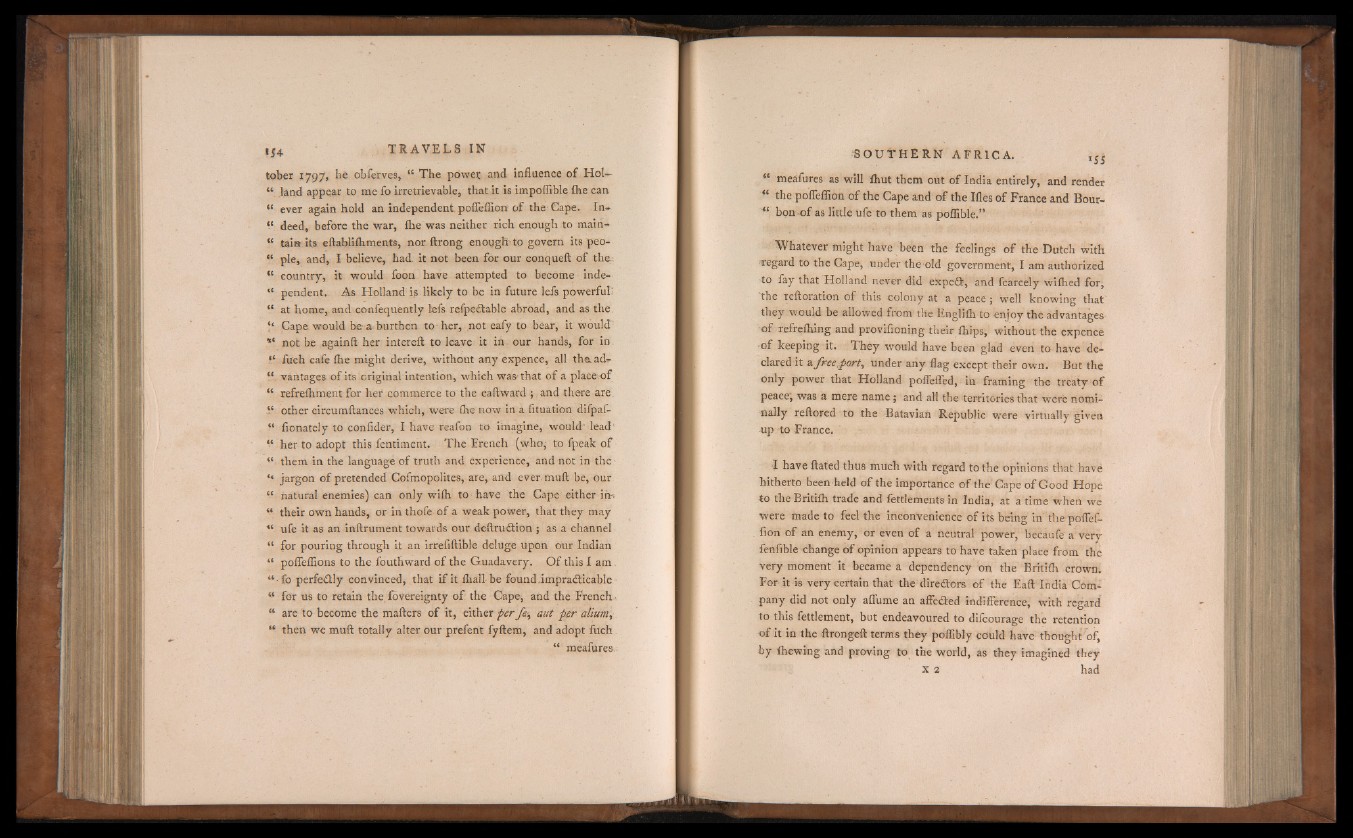
tober 1797, he obferves, “ The power and influence of Hoi—
!| land appear to me fo irretrievable, that it is impoffible ihe can
« ever again hold an independent pofleflion of the Cape. Ini'
deed, before the war, ihe was neither rich enough to mairi-
“ tain its eftablifhments, nor. ftrong enough’ to govern its peo-
f pie, and, I believe, had. it not been for our conqueft of the:
“ country, it would foon have attempted to become inde-
“ pendent.. As Holland is likely to be in future lefs powerful;
“ at home,, and confequently lefs refpedable abroad, and as the
if Cape would be a burthen to her, not eafy to bear, it would
not be againft her intereft to leave it in, our hands, for in
“ fuch cafe flie might derive, without any expence, all thead-
“ vantages of its original intention, which was* that of a place.of
“ refreihment for her commerce to the eaft ward ; and there are
f* other circumftances which, were ihe now in a fituation difpaf-
“ fionately to confider, I have reafon to imagine, would’ lead
^ her to adopt this fentiment. The Erench (who, to fpeak of
“ them in the language of truth and experience, and not in the-
‘‘ jargon of pretended Cofmopolites, are, and ever, muft be, our
“ natural enemies) can only with to have the Cape either ¡rn
“ their own hands, or in thofe of a weak power, that they may
“ ufe it as an inftrument towards our deilruction ; as a channel
“ for pouring through it an irrefiftible deluge upon our Indian
“ poffefiions to the fouthward of the Guadavery. Of this I am,
“ • fo perfectly convinced, that if it fliall be found impradiicable
“ for us to retain the. iovereignty of the Cape-, and the French •
“ are to become the mafters of it, either per fa, aut per alium,
“ then we muft totally alter our prefent fyftem, and adopt fuch
“ meafures.
“ meafures as will ihut them out of India entirely, and render
“ the pofleflion of the Cape and of the Ifles of France and Bour-
“ bon of as little ufe to them as poflible.”
Whatever might have been the feelings of the Dutch with
^regard to the Cape, under the-old government, I am authorized
to fay that Holland never did eXpe£t, and fcarcely wiihed for,
the teftoration of this colony at a peace; well knowing that
they would be allowed from the Englifh to enjoy the advantages-
of refreihing and provifioning their ihips, without the expence
of keeping it. They would have been glad even to have declared
it a free fo r t, under any flag except their own. But the
only power that Holland poflefled, in framing the treaty of
peace", was a mere name; and all the territories that were nominally
reftored to the Batavian Republic were virtually given
up to France.
I have ftated thus much with regard to the opinions that have
hitherto been held of the importance of the Cape of Good Hope
to the Britiih trade and iettlements in India, at a time when we
were made to feel the inconvenience of its being in the poflef-
fion of an enemy, or even of a neutral power, becaufe a very
fenfible change of opinion appears to have taken place from the
very moment it became a dependency on the Britifh crown.
For it is very certain that the direftors of the Eaft India Company
did not only aflume an afie&ed indifference, with regard
to this fettlement, but endeavoured to difcourage the retention
of it in the ftrongeft terms they poflibly could have thought of,
by ihewing and proving to the world, as they imagined they
X 2 h ad